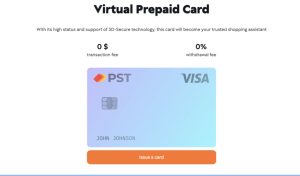Business
Prepaid Cards in Africa: Convenience, Security, and Opportunities

Access to financial tools has long been a challenge for many African residents. Not everyone has a bank account, and traditional money transfer methods are often slow and expensive. Prepaid cards solve these issues. Simply load the card with the desired amount and use it as needed, whether for online payments, cash withdrawals, or transfers.
But this isn’t just about convenience; it’s about financial freedom. Imagine having a wallet that only you can access. If you lose the card, your balance remains secure. For the African market, this is a game-changer.
Prepaid cards also enhance data security. When shopping online, a unique card number is used instead of real banking details, reducing the risk of fraud. But security is only part of the story. Africa’s digital payments sector is booming. By 2030, the prepaid card market in the Middle East and Africa is projected to reach $1.7 billion, growing at an annual rate of 20.8% from 2025. Globally, the market is moving towards $65 billion. Government support, advancing digital technology, and shifting consumer habits are driving this growth. By 2025, the potential revenue at stake will reach $40 billion, and the race for market leadership is already underway.
In this article, we compare the best prepaid card services available to African residents. Read on for an in-depth look at virtual card providers PSTNET, Ezzocard, and Kuda.
- PSTNET
PSTNET offers virtual Mastercard and Visa cards, suitable for most online purchases, including advertising, subscriptions, and e-commerce.
A key feature of PSTNET is its specialized card types tailored for different needs. For instance, there are cashback-enabled cards for advertising expenses. For online shopping, the platform provides Ultima virtual cards and standard prepaid cards. To load funds, users first deposit money into their PSTNET account and then transfer the desired amount to the card.
PSTNET’s virtual prepaid cards come with numerous advantages: zero transaction fees, free withdrawals, and no charges for frozen or blocked cards. Users set their own top-up limits, with no predefined restrictions.
Key features:
- Security: 3D Secure, two-factor authentication
- Telegram bot: Provides 3DS codes and service notifications
- Funding options: 18 cryptocurrencies, including BTC, USDT (TRC20, ERC20), ETH; Visa/Mastercard transfers; SEPA/SWIFT bank transfers
- Registration: Google, Telegram, WhatsApp, Apple ID, or email
- Customer support: 24/7 assistance via Telegram and other channels
- Ezzocard
Ezzocard offers Visa/Mastercard cards suitable for international transactions. All cards are versatile, supporting both purchases and advertising expenses.
The standout feature of Ezzocard is anonymity — no registration is required to issue a card. This is ideal for one-time purchases. Available denominations range from $10 to $2,000. However, Ezzocard cards are single-use, making them inconvenient for recurring payments like subscriptions. Users must generate a new card each time and manually renew their payments.
Ezzocard does not charge transaction fees, but there is a card issuance fee, which varies based on the card’s denomination and type.
Key features:
- Security: One-time-use cards
- Funding options: 10 cryptocurrencies, Visa/Mastercard cards
- Registration: Not required
- Customer support: Email-based support
- Kuda Cards
Kuda Technologies is a fintech company providing virtual Visa cards in Nigeria and the UK. These cards support payments on platforms like Spotify, Netflix, and Prime Video.
Designed specifically for African users — particularly Nigerians, Kuda Cards work with local currencies. However, they come with spending and deposit limits. For instance, users cannot spend more than 50,000 NGN ($40) or 250,000 NGN ($215) per transaction, depending on their account settings. These restrictions can be problematic for international purchases, such as software subscriptions or electronics from Amazon.
Kuda Cards function under a loan-based model, meaning that lump-sum payments accumulate into monthly repayment amounts, including interest. The maximum borrowing limit is 150,000 NGN (approximately $130).
Key features:
- Security: Encryption technology
- Funding options: Local bank transfers, cash deposits, mobile money transfers
- Registration: Requires app installation, verification, and physical card delivery
- Customer support: Email and phone assistance
Conclusion
Comparing PSTNET, Ezzocard, and Kuda, each prepaid card provider has distinct features and limitations.
- PSTNET is a versatile service offering Visa and Mastercard virtual cards. Ideal for advertising, subscriptions, and shopping. No transaction fees, 24/7 support, and flexible funding through 18 cryptocurrencies, cards, and bank transfers.
- Ezzocard specializes in anonymous single-use Visa cards. No registration required, with denominations from $10 to $2,000. Suitable for one-time purchases but inconvenient for subscriptions. Issuance fees vary by denomination.
- Kuda serves Nigerian residents with local currency support. Spending limits (up to $215) may restrict larger purchases. Funding options include bank transfers and mobile payments.
Ultimately, PSTNET provides the most flexible and secure solution for global transactions, thanks to 3D Secure technology and zero transaction fees. Ezzocard stands out for anonymity, though single-use cards can be inconvenient. Kuda is an excellent choice for African users needing local currency support, but its spending limits and loan-based model may not suit international buyers.
For optimal financial flexibility, users can combine these services: PSTNET for regular payments, Ezzocard for anonymous one-time purchases, and Kuda for local transactions. This strategy maximizes security, optimizes costs, and ensures seamless financial management.
Kenya Insights allows guest blogging, if you want to be published on Kenya’s most authoritative and accurate blog, have an expose, news TIPS, story angles, human interest stories, drop us an email on [email protected] or via Telegram
-

 Grapevine1 week ago
Grapevine1 week agoAlleged Male Lover Claims His Life Is in Danger, Leaks Screenshots and Private Videos Linking SportPesa CEO Ronald Karauri
-

 Lifestyle1 week ago
Lifestyle1 week agoThe General’s Fall: From Barracks To Bankruptcy As Illness Ravages Karangi’s Memory And Empire
-

 Grapevine3 days ago
Grapevine3 days agoRussian Man’s Secret Sex Recordings Ignite Fury as Questions Mount Over Consent and Easy Pick-Ups in Nairobi
-

 Investigations2 weeks ago
Investigations2 weeks agoEpstein Files: Sultan bin Sulayem Bragged on His Closeness to President Uhuru Then His Firm DP World Controversially Won Port Construction in Kenya, Tanzania
-

 Business2 weeks ago
Business2 weeks agoKRA Can Now Tax Unexplained Bank Deposits
-

 Investigations1 week ago
Investigations1 week agoEpstein’s Girlfriend Ghislaine Maxwell Frequently Visited Kenya As Files Reveal Local Secret Links With The Underage Sex Trafficking Ring
-

 News1 week ago
News1 week agoState Agency Exposes Five Top Names Linked To Poor Building Approvals In Nairobi, Recommends Dismissal After City Hall Probe
-

 Investigations16 hours ago
Investigations16 hours agoMulti-Million Dollar Fraud: Three Kenyans Face US Extradition in Massive Cybercrime Conspiracy



















